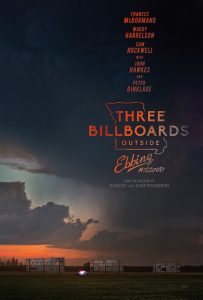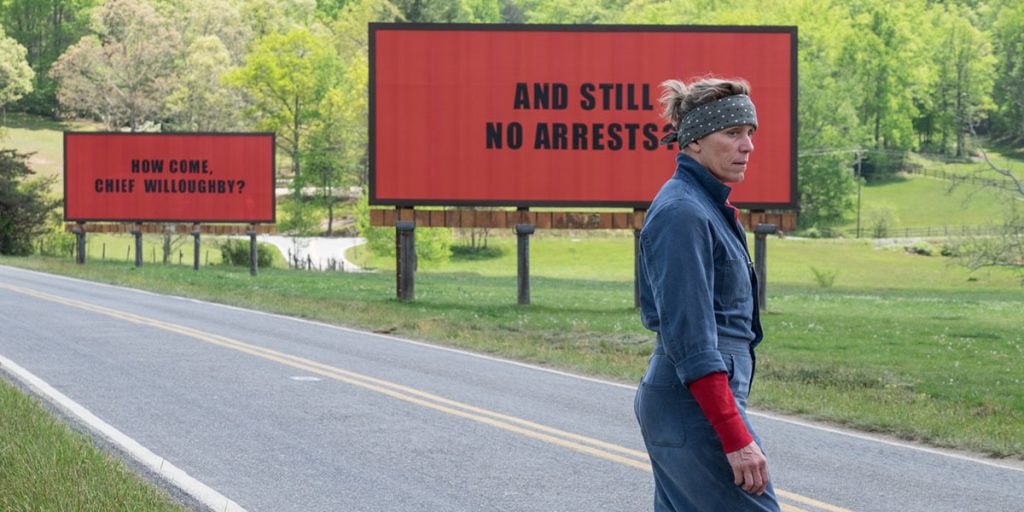One of the best films in the 2017 Venice Film Fest, Three Billboards Outside Ebbing, Missouri is a darkly comedic drama, written and directed by Oscar winner Martin McDonagh.

After months have passed without a culprit in her daughter’s murder case, Mildred Hayes (Frances McDormand) makes a bold move, commissioning three signs leading into her town with a controversial message directed at William Willoughby (Woody Harrelson), the town’s revered chief of police. When his second-in-command Officer Dixon (Sam Rockwell), an immature mother’s boy with a penchant for violence, gets involved, the battle between Mildred and Ebbing’s law enforcement is exacerbated.
A last stand erupts in Martin McDonagh’s trip into small town America in THREE BILLBOARDS OUTSIDE EBBING, MISSOURI, as a mother is pushed to the edge by her daughter’s unsolved murder. The film is the third from Martin McDonagh, the Irish playwright, screenwriter and director known for the hit thriller IN BRUGES, with its Oscar® nominated and BAFTA winning Screenplay, and the crime comedy SEVEN PSYCHOPATHS.
It all begins with Mildred Hayes and the three billboards she rents on Drinkwater Road. “I decided the buyer of the billboards was an aggrieved mother and from there things almost wrote themselves,” McDonagh recalls. “Mildred was someone strong, determined and raging, yet also broken inside. That was the germination of the story.”

It was a story that would lead to Oscar-winner Frances McDormand channeling a modern, female variant of the classic western hero in a showdown-style performance.
John Wayne as Role Model
“I really latched onto John Wayne in a big way as my physical idea, because I really had no female physical icons to go off of for Mildred,” she explains. “She is more in the tradition of the Spaghetti Western’s mystery man, who comes walking down the center of the street, guns drawn, and blows everybody away — although I think it’s important that the only weapons Mildred ever uses are her wits.”
“I could see it in her walk and her attitude,” says McDonagh. “I think John Wayne did become a touchstone to a degree for Frances. But I also see Brando and Montgomery Clift in there, too.”
McDonagh’s First Female Lead
Mildred marks the first time McDonagh has written a female lead for a film, but she is perhaps his most relentless character as well, an aggrieved mother without regret who comes to test the very fabric of her town.
Joining McDonagh and McDormand in the ensemble at the heart of the film are acclaimed actors Woody Harrelson, Sam Rockwell, Abbie Cornish, John Hawkes, Lucas Hedges and Peter Dinklage.
“It seems like the local police department is too busy goin’ ‘round torturing black folks to be bothered doing anything about solving actual crime, so I kinda thought these billboards might, y’know, concentrate their minds some”–Mildred Hayes
At the core of THREE BILLBOARDS OUTSIDE EBBING, MISSOURI is Mildred’s conflict with Ebbing’s Chief of Police. “The story is a war between two people who are both to some degree in the right,” McDonagh notes, “and that’s where so much of the tension and drama arises.”
Those tensions become the exploration for what happens when rage can’t be calmed. As the tension mounts, the film delves into themes of division, anger and moral reckoning.
Asks McDonagh: “Where do you go when you’re in a place of loss and anger that’s dead-ended? What can you do, constructive or destructive, to shake things up and get something done? It’s an interesting idea to explore, that of what happens when there might not be any hope in a situation but you decide you’re going to keep making waves until hope arrives. I think that’s why this feels different from most crime films; there’s the lingering question of ‘what if there is no solution to this crime?’”
Perhaps McDonagh’s greatest challenge was balancing the dark comedy of the story with Mildred’s emotion-driven quest. He trusted that the humor would be there, black and biting, even as he allowed his characters to reel with anguish over loss, unfairness and the resistance to change.
“What’s happened to Mildred’s daughter is so sad and horrific, I felt the most important thing was to keep a rein on the comedy, even on the blackness, and make sure Mildred’s struggle against the hopelessness of the situation maintained itself all the way through, tone wise,” McDonagh says.
McDonagh’s distinctive way of overlapping tones is something actors love. Observes cast member Lucas Hedges: “Martin’s dialogue is both fantastical and realistic at the same time, which is a dream for an actor. He writes emotionally honest text that is almost Shakespearean at times in how elevated it is.”
Adds Abbie Cornish: “There’s something very raw about Martin’s tone. It’s not smoke and mirrors, but the opposite: it’s just truth.”
The film is the most tragic he has written so far yet it is also a search for hope. “The starting place is quite sad, but there’s a lot of comedy in it and hopefully it’s quite moving in parts as well,” he reflects. “I guess that’s the way I see life. I see sadness in certain aspects, but my tendency is always to try to temper that with the bright side, with humor, however black it may be, and with the struggle against hopelessness.”
For producer Graham Broadbent, who partnered with McDonagh on IN BRUGES and SEVEN PSYCHOPATHS, and produced the film with McDonagh and Pete Czernin, the result is a film that “walks a tightrope of comedy and sadness–and is narratively ingenious.”
McDonagh’s instincts kept him balanced. “I think it comes from Martin’s days in theatre,” says the producer. “On set it seems in his head he’s already jumped ahead to how people will respond. With Martin, you know the words he’s written and the performances he’s going to get are all going to land with the audience.”
Credits:
Fox Searchlight Pictures and Film 4 present, a Blueprint Pictures production, a Martin McDonagh film, written and directed by Martin McDonagh, starring Frances McDormand, Woody Harrelson, Sam Rockwell, Abbie Cornish, Lucas Hedges, Željki Ivanek, Caleb Landry Jones, Clarke Peters, Samara Weaving with John Hawkes and Peter Dinklage.
The producers are Graham Broadbent, Pete Czernin and Martin McDonagh with executive producers Bergen Swanson, Diarmuid McKeown, Rose Garnett, David Kosse and Daniel Battsek and co-producer Ben Knight.
The filmmaking team includes director of photography Ben Davis, BSC, production designer Inbal Weinberg, film editor Jon Gregory, ACE, costume designer Melissa Toth, music by Carter Burwell and casting by Sarah Halley Finn.










